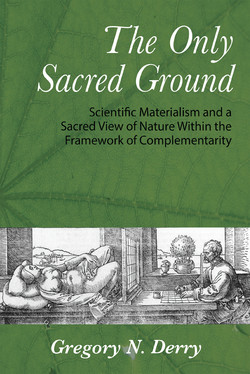The Only Sacred Ground

Реклама. ООО «ЛитРес», ИНН: 7719571260.
Оглавление
Gregory N. Derry. The Only Sacred Ground
Отрывок из книги
The Only Sacred Ground
Scientific Materialism and a Sacred View of Nature Within the Framework of Complementarity
.....
At the heart of Bohr’s reasoning is his contention that all of our knowledge about a physical object comes through some interaction with that object. In the case of quantum physics, the interaction takes the form of some experimental apparatus, and this can be precisely specified and described. If we wish to broaden this epistemological lesson to the world at large, what should play the role of the experimental apparatus? In addressing this question, the first thing we notice is that this more general case quite obviously demands the presence of a conscious observer, a knowing subject interacting with the object in the world. (The potential need for conscious knowing observers in quantum theory has been a controversial point of contention; we will assume here, in agreement with Bohr, that conscious observers are unnecessary in quantum theory.) The implications of needing knowing subjects for the acquisition of knowledge have long been a traditional problem in philosophy, a prominent example being the critical philosophy of Kant and his successors. What is new here is to think of this as an extension of the insights gained by examining the problem of knowledge in light of the issues we find in quantum theory, because that is the process by which complementarity takes on a central importance and a new methodological clarity.
Bohr’s contentions concerning the inseparability of the observer from the object of knowledge carried a drastic implication: knowledge of the object is no longer independent of the conditions of observation. This aspect of the subject/object relationship is a crucial ingredient in the development of complementarity. Because knowledge of the world depends on the conditions of observation, we need to carefully specify these conditions in order to have any meaningful knowledge at all. In the case of atomic physics, the specifications merely concern experimental arrangements, and the only knowledge we might want is objective knowledge. For the more general subject/object context presently under discussion, knowledge concerning nature will not necessarily be objective. The crucial importance of carefully specifying the conditions of observation, however, is once again mandated by the inclusion of an observer, just as in Bohr’s interpretation of quantum mechanics. But our generalization requires that we go well beyond the mere description of an experimental arrangement. For the case of a knowing subject, the kinds of questions being asked; the state of consciousness of the observer; the modes of communication possible and those employed; the role of multiple observers and/or technology used in observation; the effects of culture and history, of time, place, and intention; all these things must be taken into account in order to understand the meaning of any knowledge we may have of nature. Answering these kinds of questions constitutes the methodology that I’m advocating in this work. Performed successfully, a proper specification of the conditions under which knowledge of nature is acquired results in the complementarity framework being free of logical contradictions. The conditions under which nature is found to be sacred are not those under which it is mundane. Both sets of conditions are valid, both are needed for a complete view; and both refer to the same world. This world, I contend, is both sacred and mundane.
.....